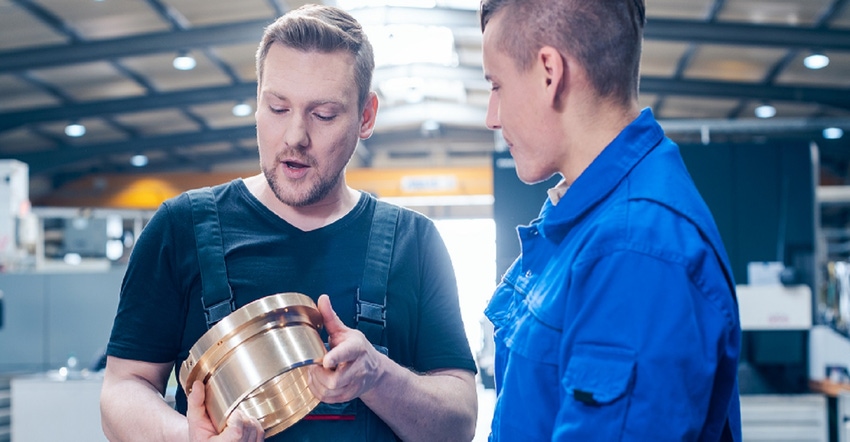Manufacturers Struggling to Close the Manufacturing Skills Gap
Manufacturers face a growing gap between the skills they need and the skills available in the work market. Education may provide part of the answer.
May 4, 2021

Manufacturing has taken a hit during the pandemic. According to the Bureau of Labor Statistics (BLS), manufacturing employment increased by 53,000 in March. Despite those recent gains, industry employment is 515,000 below its February 2020 level. Yet more manufacturing industries are adding jobs than losing jobs. In March, average hourly earnings for all employees in manufacturing increased by 5 cents to $29.15. The average hourly earnings of production workers increased by 3 cents to $23.28.
Yet manufacturers still speak of unfilled jobs. A Deloitte Consulting report projects 3.5 million manufacturing jobs needed by 2025 and expects 2 million of them to go unfilled. Companies are seeing the potential of apprenticeship programs to help minimize skyrocketing costs associated with these gaps. Many companies are turning to automation to bridge the jobs gap.
The Manufacturing Institute is working to create awareness and education opportunities so young people can learn the skills necessary to fill advanced manufacturing jobs. During the pandemic, the organization has tried to make training more accessible through virtual networking opportunities and connections with manufacturing hiring managers.
We caught up with Carolyn Lee, executive director of The Manufacturing Institute, to find out how educational training to coping with the skills and jobs gap.
One of the problems cited by the manufacturing industry is the difficulty in finding skilled workers. Many expert workers are retiring, and there are few equally experienced workers to replace them. “Manufacturers consistently identify the lack of qualified workers as the biggest challenge they face,” said Lee. “The results of our 2018 MI/Deloitte study on the skills gap in manufacturing identify a widening gap between the jobs that need to be filled and the skilled talent pool capable of filling them.”

Numerous studies by the BLS and private research firms report that the manufacturing skills gap is expected to grow during this decade. “By 2028, 4.6 million manufacturing jobs will need to be filled, and 2.4 million are expected to go unfilled due to the skills gap. To combat these challenges surrounding a lack of a workforce with the necessary qualifications, the MI provides programming and initiatives for the current and emerging manufacturing workforce, including women, veterans, and students.”
The pandemic slowed manufacturing, but it didn’t completely stop production. The skills gap was apparent even during the spike in unemployment. “Skilling new entrants or upskilling existing workers is a priority for modern manufacturing,” said Lee. “Even during the height of national unemployment due to COVID-19, manufacturers have continued to be faced with nearly 500,000 open jobs, so the bottom line is that we do not have enough people with the right skills to fill our jobs.”
Some manufacturers are deploying technology to close the gap, but it’s not likely to be a complete answer, since the emerging technology also requires skilled technicians. “While automation may be eliminating tasks for some workers, the human skills of critical thinking, innovation, creativity, and problem-solving remain very much in demand and that’s why vocational and technical education should be available and of interest to all who want to be a creator,” said Lee.
Manufacturing Jobs Remain Attractive
Once skilled, manufacturing workers can expect decent employment. “Modern manufacturing provides opportunities for creators, makers, and collaborators who are designing and building America’s future,” said Lee. “With skills in high demand, jobs are well rewarded. On average, a career in manufacturing pays more than $84,000 a year in salary and benefits. It’s the path to a secure career, with many opportunities to progress and grow.”
Lee believes increased education and training are needed to support the US manufacturing base. “Preparing people for a career in manufacturing is a key mission of The Manufacturing Institute (MI). Our FAME program, founded by Toyota in 2010 and operated by the MI since 2019, stands for Federation of Advanced Manufacturing Education. Chapters in 16 states provide global-best workforce development through strong technical training, integration of manufacturing core competencies, intensive professional practices, and hands-on experience,” said Lee. “Participants in the FAME Program will start a work/study program to earn an associate degree and certification as an Advanced Manufacturing Technician. More than 85 percent of those completing the program hired by the companies that sponsor them in the program.”
Reaching Out to Veterans
As well a training young people, MI has developed a program to prepare veterans for manufacturing jobs. “Our Heroes MAKE America initiative, tailored for transitioning service members, veterans, and the greater military community, seeks to build connections between the military community and manufacturing,” said Lee. “Our training programs provide graduates with a variety of in-demand manufacturing credentials as well as wrap-around career readiness support and connections into the manufacturing sector.”
MI offers students several certifications tailored to the needs of US-based manufacturers. “The certifications currently being offered in the program include Certified Production Technician, which includes essential manufacturing credentials: safety, quality, maintenance, manufacturing processes, and production,” said Lee. “OSHA 10, Forklift Operation, Mechatronics, and the Certified Logistics Technician are all certifications suited to make graduates ready for in-demand careers.”
Local Training
MI works with local education organizations to provide direct training to local students. “FAME classes and training are hosted in coordination with the local community or technical colleges or universities where students can earn an associate degree as well as industry-recognized credentials,” said Lee. “The training is implemented by a college partner. FAME programs are a conduit between industry and education, providing companies with the skilled worker pipeline they need to remain globally competitive.”
Rob Spiegel has covered manufacturing for 19 years, 17 of them for Design News. Other topics he has covered include automation, supply chain technology, alternative energy, and cybersecurity. For 10 years, he was the owner and publisher of the food magazine Chile Pepper.
About the Author(s)
You May Also Like


.jpg?width=300&auto=webp&quality=80&disable=upscale)


